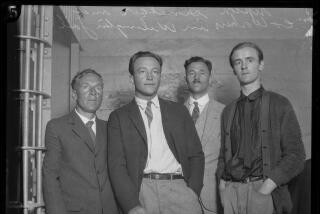William G. Smith; Lawyer for Draft Resisters, Veterans
- Share via
William G. Smith, a civil rights attorney who spearheaded the defense of draft resisters in the Vietnam War era and later became a vigorous advocate for disabled veterans, died at his Los Angeles home Monday after a 2 1/2-year battle with cancer. He was 66.
A Los Angeles native, Smith was a former Air Force captain whose deep antiwar beliefs led him to devote much of his legal career to helping people who wanted to avoid military service. He immersed himself in federal case law and Selective Service regulations in search of loopholes that would benefit his clients, many of whom were poor blacks and Latinos.
He strove to find legal ways to avoid induction, telling an interviewer once that most of his clients did not want to go to jail or leave the country. Such drastic tactics made no sense to him, at any rate, because “it’s so easy to use the legal channels,” he said in 1969.
Smith began counseling young men on draft law in 1966, when few if any lawyers had the knowledge to ably guide people trying to find a way out of military service. By 1969 he had worked on 3,000 cases, including those of students at Harvard, Yale and elsewhere in the country.
He also published an anti-draft newsletter called Counterdraft, which he mailed to hundreds of lay counselors and lawyers around the country. He opened several draft counseling centers at bookstores and churches in Los Angeles and trained thousands of draft counselors, usually at his own expense.
Saying he did not want to be seen as a war profiteer, Smith charged minimal fees for his services, and charged nothing if his clients were poor, black or Latino.
“He was opposed to using young men, the poor and minorities” to make war on other countries, “so he devoted his time to helping those who didn’t want to go,” said his wife of 32 years, civil rights attorney Carol Smith.
One of her husband’s best-known cases involved David Wayte, a former Yale philosophy major who in 1982 was among at least 800,000 men between ages 18 and 21 who failed to register for the draft. Of that total, Wayte was one of only 43 to be targeted for criminal prosecution by the U.S. Department of Justice. He was sentenced to six months confinement in his grandmother’s Whittier home.
After the Vietnam War ended, Smith began to focus on the battles that veterans of that conflict were facing at home as they sought compensation for war injuries. Again, he was at the forefront of those legal fights.
For many years, veterans were essentially barred from hiring attorneys to help them negotiate the byzantine regulations of the Department of Veterans Affairs because of a federal law that said lawyers could not charge them more than $10. “So attorneys would not take these cases--unless they were Bill Smith,” said Keith Snyder, president of the National Organization of Veterans Advocates, which he co-founded with Smith in 1993.
Now, about 125 lawyers around the country specialize in veterans rights. They all handle cases that rely in large part on precedents Smith helped establish.
One of Smith’s most important victories came in a 1992 case against the VA that sought to require the agency to check Social Security records in qualifying a veteran as disabled and eligible for benefits.
The VA was denying benefits to hundreds of veterans because it never bothered to obtain the Social Security records that showed their disabilities, Snyder said. Smith argued before the Court of Veterans Appeals in Washington that those files were pertinent evidence and that the VA’s “duty to assist” veterans included getting them.
That case, Snyder said, has been a major factor in veterans winning increased VA benefits.
But not all of Smith’s cases involved such weighty issues. In the 1970s he defended a Navy enlistee who was charged with assault for throwing a pie in his commander’s face. Smith enlisted expert testimony from comedian Soupy Sales, who told the court he had launched perhaps 20,000 pies without once being prosecuted. The enlisted man was acquitted.
Smith is survived by his wife; daughters Diane, Carin and Rhonda; brother Richard; sister Beverly; and granddaughter Yana Lee.
More to Read
Sign up for Essential California
The most important California stories and recommendations in your inbox every morning.
You may occasionally receive promotional content from the Los Angeles Times.














